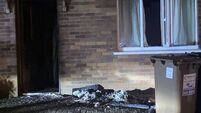Housing charity Threshold sees 54% leap in calls about tenancy

Launching its 2015 annual report, Threshold said this year it has already seen a 26% rise in the numbers coming to its services about rent arrears and lease terminations.
The charity’s chairwoman, Aideen Hayden, said many of those seeking assistance now are facing notice of termination because landlords are either selling up or because they want to use the property for themselves.













